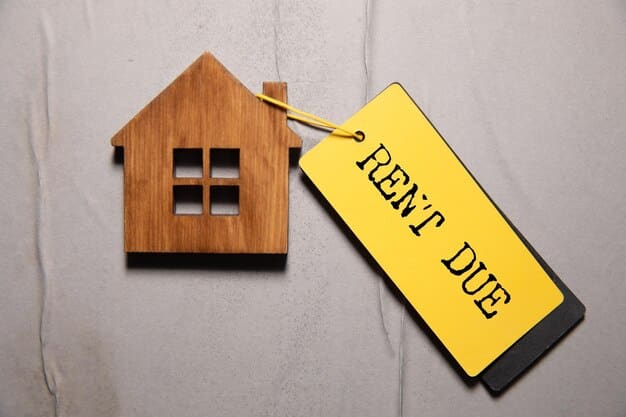Passive Income Alert: 2025 Tax Law Changes for Rental Owners

Navigating the complexities of passive income from rental properties is about to change. The new tax laws in 2025 will significantly affect rental property owners, potentially altering deductions, depreciation, and overall profitability, requiring investors to adapt their strategies for optimal tax efficiency.
Get ready for a shift in the landscape of rental property ownership! The year 2025 is bringing significant changes to tax laws that will directly impact how you, as a rental property owner, manage your passive income alert: new tax law changes affecting rental property owners in 2025 and investments. It’s time to gear up and understand what’s coming.
Understanding the Current Tax Landscape for Rental Properties
Before diving into the specifics of the 2025 tax law changes, it’s crucial to have a solid grasp of the existing tax rules governing rental properties. This foundation will make it easier to understand the incoming changes and how they will affect your financial strategies.
Key Tax Deductions for Rental Property Owners
Currently, rental property owners can take advantage of quite a few tax deductions. Knowing these deductions can significantly reduce your taxable income.
- Mortgage Interest: You can deduct the interest you pay on your mortgage, which is often the largest expense associated with owning a rental property.
- Depreciation: Buildings depreciate over time. The IRS allows you to deduct a portion of the property’s cost each year. For residential rental properties, this is typically spread over 27.5 years.
- Operating Expenses: Expenses such as repairs, property management fees, insurance, and property taxes are all deductible.
- Travel Expenses: If you travel to manage or maintain your rental property, those travel expenses can also be deducted, with some limitations.
Remember these are just some quick pointers, and tax laws are subject to change. Always consult with a professional when completing your tax returns.
The Importance of Accurate Record-Keeping
Maintaining accurate and comprehensive records is essential for rental property owners. Without proper documentation, claiming deductions can become challenging, and you risk facing issues during an IRS audit. Keep detailed accounts of all income and expenses, including receipts, invoices, and bank statements.
Understanding the current tax situation enables rental owners to navigate potential changes on the horizon. It’s your bedrock for future financial changes. Remember to review your practices every year.
Previewing the 2025 Tax Law Changes: What to Expect
The upcoming 2025 tax law changes are poised to reshape the financial strategies of rental property owners. While the full details are still being finalized, we can preview what may be expected based on current legislative proposals and expert analyses.

Potential Changes to Depreciation Rules
One of the most significant areas of potential change revolves around depreciation. The existing system allows rental property owners to depreciate the cost of their buildings over 27.5 years for residential properties. The new laws could alter both the depreciation timeline and the methods allowed, which could impact the annual deductions available to rental owners.
It is important to stay up to date and work with a professional to monitor any laws around depreciation.
Impact on 1031 Exchanges
Section 1031 exchanges, which allow investors to defer capital gains taxes when selling one investment property and reinvesting the proceeds into another like-kind property, could see significant revisions or even be limited under the new laws. Here’s a more in depth look:
- Potential Limitations: The new tax law could limit the types of properties that qualify for 1031 exchanges.
- Increased Scrutiny: Expect increased IRS scrutiny of 1031 exchanges, requiring more rigorous documentation and compliance.
- Impact on Investment Strategies: Changes to 1031 exchanges might force investors to reassess their long-term investment strategies, potentially leading to increased tax liabilities.
Investors and real estate professionals anticipate a change in the real estate markets, with tax implications influencing sales and purchases.
Changes in Qualified Business Income Deduction
The qualified business income (QBI) deduction allows eligible self-employed and small business owners to deduct up to 20% of their qualified business income. Any alterations to the QBI deduction could substantially impact the tax liabilities of rental property owners who actively manage their properties.
Rental property owners should stay alert as more definitive information emerges.
Strategies to Adapt to the New Tax Environment
As the 2025 tax law changes approach, rental property owners must take proactive steps to adapt and optimize their tax strategies. Implementing the right measures now can mitigate potential tax increases and ensure ongoing profitability.
Re-Evaluating Your Investment Approach
Consider reassessing your current investment approach to align with the prospective tax changes. This might involve adjusting the types of properties you invest in, how you manage them, or the length of time you hold onto them.
It is also important to consider your personal and financial goals, not just the latest tax law.
Maximizing Deductions Under the New Rules
Even with changes to tax laws, there will still be opportunities to maximize deductions. Rental property owners should focus on identifying and utilizing every eligible deduction under the new framework.
Make sure you have adequate documentation to support tax deductions. Maintain clean records and communicate with your professional when in doubt.
Seeking Professional Tax Advice
Navigating complex tax laws requires expert guidance. Engaging a qualified tax advisor or accountant is essential for rental property owners to stay compliant and optimize their tax position.
Understanding Cost Segregation Studies
Did you know a cost segregation study can accelerate depreciation deductions? This involves identifying property components that can be depreciated over shorter periods, reducing your current tax liability.

Rental property owners can stay proactive and well-prepared by taking the time to adapt to the new tax environment.
How to Prepare Your Rental Property Business for 2025
Preparing your rental property business for the tax law changes in 2025 involves several key steps, from conducting a thorough financial review to making strategic adjustments to your operational practices.
Conducting a Financial Review
Start by conducting a comprehensive review of your rental property business’s finances. This assessment should include an analysis of your income, expenses, and existing tax deductions.
A look at the past can help you create the future you want for your portfolio. It can expose areas of success and opportunities for adjustment.
Updating Your Financial Records and Digital Tools
Ensure that your financial records are accurate, well-organized, and up-to-date in time for 2025. Consider upgrading to a digital accounting system or software that can help streamline your record-keeping processes. Here’s a few pointers:
- Utilize Cloud-Based Accounting Software: These tools can automate tasks like expense tracking, invoice generation, and financial reporting.
- Set Up Automated Alerts: To remind you of important tax deadlines and payment schedules.
- Regularly Back Up Your Data: Protect your financial information by backing up your data regularly.
Properly manage all paperwork regarding your investments to ensure the data is there for audits. Make it accessible to those who need it and provide backups regularly.
Consulting with Financial Professionals
Engage with financial advisors, tax consultants, and real estate experts to gain insights and advice tailored to your business needs. These professionals can help you understand the intricacies of the new tax laws and develop personalized strategies to mitigate their impact.
Financial professionals are critical when changes are made. Rely on them to help you make the best decisions for your portfolio.
Real-Life Examples of Tax Planning for Rental Owners
To better understand how the 2025 tax law changes could affect rental property owners, let’s consider a couple real-life tax planning examples. These scenarios are based on common situations and illustrate how strategic planning can make a significant difference.
Scenario 1: The Impact of Depreciation Changes
Imagine you own residential rental property valued at $300,000, under the current tax laws, you depreciate the property over 27.5 years. Now, let’s say the new tax laws extend the depreciation period to 35 years. This would lower your annual depreciation deduction, resulting in a higher taxable income.
You can use financial tools to project your tax liabilities and make sure you are in compliance. Remember, be proactive and don’t wait until the last minute.
Scenario 2: Navigating Changes to 1031 Exchanges
In another scenario, you’re planning to sell a rental property and reinvest the proceeds into another property using a 1031 exchange. If the new tax laws restrict the types of properties that qualify for a 1031 exchange, you might be forced to pay capital gains taxes on the sale. To mitigate this, you could work with a tax advisor to identify qualifying properties.
Keep up to date on all investment opportunities. When working with investments, be sure your goals are known and documented along the way.
Strategies for Both Scenarios
In both scenarios, the key to successful tax planning involves proactive preparation. This includes staying informed about the specific changes to tax laws, seeking professional advice, and adapting your investment and operational strategies accordingly.
Tax laws can be confusing, so be sure to partner with an expert in the field to help keep you compliant and growing.
Resources for Staying Informed About Tax Law Changes
Staying informed and up-to-date of any changes to tax laws is important for rental property owners. Luckily, there are plenty of resources available to access reliable and timely information.
Government and Official IRS Resources
The IRS website is a primary resource for staying up to date on tax law changes. The IRS provides comprehensive information on tax laws, regulations, and updates. Other government resources include publications and announcements from the Treasury Department and Congressional websites.
- IRS Website: Provides tax forms, instructions, and publications.
- Treasury Department: Releases information about tax law changes and economic policies.
- Congressional Websites: Offer insights into proposed legislation and committee reports.
Make an effort to visit these sites once per quarter, or reach out to a professional who will do it for you.
Financial News and Professional Associations
Reliable financial news sources and professional associations can also provide valuable insights. Reputable financial news outlets offer coverage of tax law changes, while organizations like the National Association of Realtors® (NAR) and the American Institute of CPAs (AICPA) provide resources tailored to rental property owners.
Keep a lookout for any reputable financial news sources to ensure you are up to date on any tax laws relevant to you.
Subscription Services and Newsletters
Consider subscribing to newsletters and services that focus on tax law updates and analysis. Many tax advisory firms and financial institutions offer free or subscription-based services that deliver up-to-date information directly to your inbox.
There are also a lot of subscription services that can help you grow and scale your accounting knowledge. Be sure to vet them and partner with the best!
| Key Point | Brief Description |
|---|---|
| 🚨 2025 Tax Law Changes | Significant changes are coming, affecting deductions, depreciation, and overall profitability for rental owners. |
| 🏢 Depreciation Adjustments | Expect potential changes to depreciation timelines, impacting annual tax deductions for rental properties. |
| 🔄 1031 Exchange Impacts | Revisions to 1031 exchanges may limit qualifying properties, potentially increasing tax liabilities when reinvesting. |
| 📈 QBI Deduction Changes | Alterations to the Qualified Business Income deduction could significantly affect tax liabilities for active rental property managers. |
Frequently Asked Questions (FAQ)
▼
Significant alterations are anticipated in depreciation rules, potential limitations on 1031 exchanges, and modifications to the Qualified Business Income (QBI) deduction for rental property owners.
▼
The depreciation timeline for rental properties might be extended, which would reduce the annual depreciation deduction available, thereby increasing the taxable income.
▼
The types of properties eligible for 1031 exchanges could face limitations. This could potentially force investors to pay capital gains taxes when re-investing in other properties.
▼
Yes, alterations to the QBI deduction could substantially impact the tax obligations for rental property owners who are actively involved in managing their properties.
▼
Rental property owners should stay informed about tax law changes, maintain detailed financial records, and consult with tax professionals to adjust their investment strategies proactively.
Conclusion
As 2025 approaches, staying informed and adapting your strategies is key. The new tax law changes affecting rental property owners present both challenges and opportunities. By understanding the potential impacts and taking proactive steps to prepare, you can navigate this new landscape and maintain a profitable and tax-efficient rental property business.





